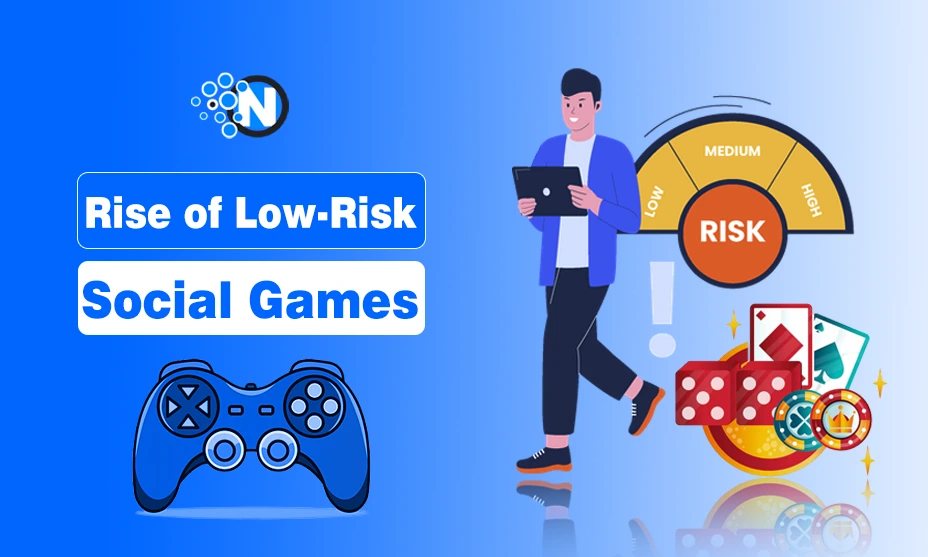Rise of Low-Risk Social Games – A Fun Alternative for Casual Gamers

If you’re familiar with modern technology, you know that online games have become a huge part of the entertainment industry. Billions of people are enjoying different types of games in order to have fun and engage with other gamers from around the world.
There are some games that are related to high stakes and are a bit risky to play since you can lose your money. It makes it an unattractive option for casual gamers. Casual gamers want fun that comes with low risk. This type of entertainment is now being provided by low-risk social games.
There is no real money related to these titles, which makes them a good option for casual gamers. In this article, I am going to discuss more details about these games.
Understanding the Popularity of Social Games
Social games have become increasingly popular because they’re both fun and engaging to play.
One key aspect of their popularity is the extensive variety offered by social games. They often feature classic game favorites such as slots, poker, roulette, and blackjack, but reimagined in a social and casual context.
In some top social casino games, players enjoy not just the gameplay but also the interactive aspects, such as leaderboards, challenges, and tournaments, fostering a sense of community and friendly competition.

Additionally, social casino games often utilize gamification techniques, such as leveling up, earning achievements, or unlocking new game content, to increase player engagement and retention.
Moreover, social games often collaborate with popular brands, celebrities, or franchises to attract a wider audience. This strategy leverages the existing fanbase of these entities, further driving user engagement and fostering loyalty.
Players are drawn not only by the games themselves but also by familiar characters, themes, and narratives that resonate personally, making the experience even more engaging.
Why do Casual Gamers Choose Social Games?
Casual gamblers are attracted to social games for numerous reasons, with the primary factor being the absence of financial pressure. Unlike real-money games, social titles provide an environment where players can explore games without the fear of substantial financial losses.
This low-risk environment encourages players to experiment freely, making it an ideal space for beginners or those who simply enjoy gambling as a recreational activity.
1. Legal and accessible option:
Furthermore, social titles offer a convenient entry point into gambling experiences without the legal and regulatory hurdles associated with real-money gambling platforms. Given the complex regulatory landscape across various jurisdictions, especially in the United States, the games offer a decent alternative where gambling-like entertainment is available legally and ethically.
2. Convenience and mobile compatibility:
The accessibility and ease of use provided by mobile applications and web-based platforms further enhance their appeal. Players can enjoy social games anytime and anywhere, turning idle moments into engaging entertainment sessions without any issue.
3. Safe place for gaming:
Another significant attraction is the safe environment social games provide, particularly for those concerned about gambling addiction. Without the possibility of real monetary losses, players can safely indulge their interests without the fear of negative consequences impacting their finances or mental well-being.
Psychological Attraction: The Thrill Without the Risk
An essential aspect of social games’ appeal is psychological. The excitement of winning—even virtual rewards—triggers dopamine releases similar to those experienced in real gambling scenarios, creating feelings of pleasure and satisfaction without the stress of actual monetary loss.
1. Social interaction:
Additionally, the social features prevalent in social games offer psychological fulfillment through community and connection. Players interact with friends, participate in challenges, and compete in tournaments, creating shared experiences that transcend mere gameplay. This communal aspect is particularly appealing, providing emotional and social gratification often missing in solitary gambling experiences.
2. Stress-free environment:
Further psychological research points out that the absence of real-world stakes allows players to indulge their competitive instincts more freely, fostering a playful and enjoyable atmosphere. This relaxed approach contrasts sharply with the stress that can accompany traditional gambling, where players constantly balance the excitement of potential wins with the anxiety of financial risk.
Technological Innovations Driving Social Game Popularity
Advancements in technology have substantially contributed to the rising popularity of social games. Enhanced graphics, immersive soundtracks, and sophisticated gameplay mechanics make games very interesting to play. Additionally, innovations like Augmented Reality (AR) and Virtual Reality (VR) are beginning to make headway, offering players more immersive and engaging experiences that closely mimic physical games.
1. Personalization with AI:
The integration of Artificial Intelligence (AI) in personalizing user experiences is another significant technological stride. AI and ML algorithms help customize game recommendations and challenges based on player preferences and gaming patterns, significantly enhancing individual user engagement and satisfaction. This personalization ensures that each player feels uniquely valued and understood, further cementing their loyalty to the platform.
2. Mobile device compatibility:
Furthermore, advancements in mobile technology and network infrastructure have dramatically improved accessibility, allowing seamless gameplay experiences regardless of location or device, further broadening the appeal of social games.
Regulatory and Ethical Considerations
Despite their popularity, social games must continuously navigate regulatory and ethical challenges, particularly regarding responsible gaming practices. While social titles do not involve real-money gambling, there remains a risk that simulated gambling experiences could potentially encourage problematic behaviors.
Leading social games platforms proactively address these concerns by implementing robust responsible gaming measures, such as play limits, user-controlled spending caps, and educational resources promoting balanced entertainment. These initiatives align with guidelines set forth by prominent organizations such as the Responsible Gambling Council (RGC), ensuring a safe and positive environment for users.
Conclusion
Gaming, without a doubt, is one of the best ways of entertaining yourself. Some people even use it to earn rewards in the form of real money. However, many casual gamers prefer not to stress themselves by playing for real money. For these people, social games are the best.
They’re not related to real money but provide a similar experience of winning rewards. As a result, players are capable of enjoying titles without having to risk their money at the same time. Besides low risk, there are several other reasons why these titles are popular, including being convenient and a safe place to game.




